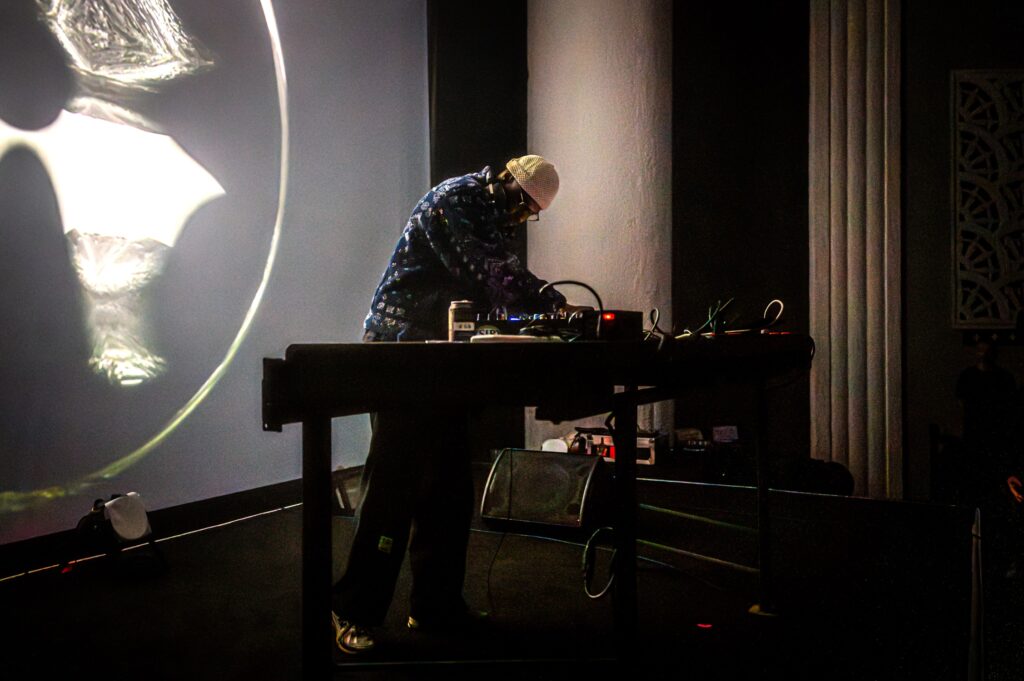The music of Chuquimamani-Condori is like a rebuke to everything the Spotify algorithm wants music to be: pleasant, a mood, conducive to productivity, unobtrusive on autoplay. Small wonder the Bolivian American artist prefers to release music through Bandcamp, the Oakland-based website that does little if you want your music to be discovered by strangers but allows the artist nearly unlimited control over the presentation, packaging, and pricing of your work—and to un-release it if need be. Much of their work requires some serious digging to find, like the bizarre Spots y Escupitajo or their first Chuquimamani-Condori album Quirquincho Medicine from 2019. Even their 2013 masterpiece The Light You Gave Me To See You, as E+E, is currently available only as a questionable third-party Bandcamp download. This is not an artist who cares much about being “accessible.”
But if you can give yourself up to music that proceeds from uncontrollable bursts of feeling, while referencing the artist’s Latin American and indigenous musical heritage, it should be pretty obvious that their new album DJ E is something special. Unmastered and available exclusively on Bandcamp, their proper debut under the Aymara name of Chuquimamani-Condori (their full name is Elly Crampton Chuquimia Quiñones-Tancara) grabs you by the collar and demands you feel what the artist is feeling for 30 minutes. It’s unrelentingly loud, regularly cutting into the red, yet it doesn’t feel like the product of negative or transgressive emotion (though “Eat My Cum” is the title of one track) so much as the the kind of rapture that might drive someone to dive into the water off a 20-foot rock. It has no ambient reprieves, its 30-minute runtime is its only act of mercy to listeners who don’t like noise, and it is one of the best albums of this young decade thus far.

The material for Chuquimamani-Condori’s Noise Pop set on Feb. 29 amounted more or less to a performance of the album, augmented by even more of the eccentric radio noises (“DJ!”) Quiñones-Tancara slathers on their music. The white Stetson atop their head, proudly displayed on the cover of DJ E, seemed to attract all the light in the room. Despite Gray Area’s massive audiovisual rig at their disposal, Quiñones-Tancara preferred simply to bathe in a massive roving beam of light that was sometimes tinted blue to resemble a fountain and sometimes red to resemble a Tarantinian spray of blood. And the music emanating from the speakers seemed ripped from this person’s very soul, with Andean rhythms and digital accordions blending with the overwhelming torrent of noise to create something less aggressive than scouring.
DJ E has found a passionate following in experimental circles, notably being named consensus album of the year by Tone Glow, the brashest and most interesting publication covering experimental music. I noticed the crowd swell substantially before Chuquimamani-Condori’s set, and the artist had trouble pushing their way through a crowd of fans and well-wishers to the stage in the back. But though they’re obviously hot shit regardless of the merits of their music, I began to wonder if the audience was getting the same extremes of emotion from the music that I was. One sample made me choke up, and a friend vaguely observed that it sounded like an accordion. Was I overrating this music just because of how powerfully it stood in opposition to all of the streaming-age corporate bullshit that treats art as marginally necessary background noise?

Headliner Actress’s set assuaged my concerns, being that it was just as opposed to streaming-era values of unobtrusive pleasantry but infinitely less enjoyable and emotionally gripping. The UK trickster born Darren Cunningham has been one of my favorites for a while—his first album Hazyville came out in 2008, the same year as Quiñones-Tancara’s E+E debut—but more through his wily sense of invention than his consistency. I reviewed his new Ninja Tune release LXXXVIII for Pitchfork, and though I accept the 7.4 it was given, this was at the higher end of my submitted score range; I listened to it less with pleasure than with relief that an artist could still behave so strangely while sharing a label with fratty fluff like Odesza. He’s like dance music’s Dylan, not because he’s a great poet but because he’s wildly all-over-the-place and seemingly allergic to giving the audience what they expect.
His set was certainly far from the cranked-out set of LXXXVIII selections I expected. What I didn’t expect was for most of the set to consist of screeching bursts of delay and high-pitched microphone feedback, which barged unceremoniously into queued-up tracks from throughout his career. I wondered if one particularly irritating noise during “it’s me ( g 8 )” was even audible to the producer. (Gas put out Der Lange Marsch with a beep on every other beat, which neither of the people he’d entrusted to mix the record could hear.) When you’re making abrasive music, the audience should at least be able to figure out if it’s on purpose or not. Chuquimamani-Condori knew exactly what they were doing. With Cunningham, I wasn’t so sure.






